Environment
Wisconsin Dodges Water-Privatization Scheme

With the lead poisoning tragedy in Flint, Michigan still playing out in the national headlines, we’ve been due for good news about our nation’s water—and Wisconsin just delivered it.
Yesterday, state leaders scrapped a bill that would have made it easier for private corporations to buy municipal water and sewer utilities across the state. The bill, introduced at the request of a for-profit water company based in Pennsylvania, would have made it more difficult for Wisconsin residents to vote on who controls their water.
The evidence against privatization is plain as day. Customers of Wisconsin’s only privately owned system—which services the city of Superior—pay the highest rates in the state. On top of the costs of water and infrastructure maintenance, Superior’s residents pay an additional nine percent to cover their private operator’s profit margin and higher private-sector debt costs.
And Superior isn’t an outlier. A new report released on Tuesday by Food and Water Watch shows that, nationally, privately owned water systems charge 58 percent more than those that are publicly owned. For example, private systems charged 84 percent more than public systems last year in Pennsylvania, adding $323 to the typical household’s annual water bill.
The math doesn’t add up—it’s not even close. Privatizing water only makes sense to for-profit investors and the politicians that think government should be run like a business.
We got a glimpse of what running government like a business looks like in Flint, where cost-cutting and austerity politics have hurt children in a city already wrecked by long-term economic decline.
Water is a human right and the bedrock of a healthy society. The systems that deliver water must be under the public’s democratic control so that it remains that way.
(Wisconsin State Capitol photo: Dori)
-

 Latest NewsApril 10, 2024
Latest NewsApril 10, 2024The Transatlantic Battle to Stop Methane Gas Exports From South Texas
-

 Latest NewsApril 23, 2024
Latest NewsApril 23, 2024A Whole-Person Approach to Combating Homelessness
-

 Latest NewsMarch 27, 2024
Latest NewsMarch 27, 2024Street Artists Say Graffiti on Abandoned L.A. High-Rises Is Disruptive, Divisive Art
-

 State of InequalityApril 11, 2024
State of InequalityApril 11, 2024Dispelling the Stereotypes About California’s Low-Wage Workers
-

 Latest NewsApril 24, 2024
Latest NewsApril 24, 2024An Author Reflects on the Effort to Rebuild L.A. After the ‘Violent Spring’ of 1992
-

 State of InequalityMarch 28, 2024
State of InequalityMarch 28, 2024Los Angeles Hotel Workers Could Use the 2028 Olympics to Their Advantage
-

 Striking BackApril 12, 2024
Striking BackApril 12, 2024Organizing the Slopes
-

 State of InequalityApril 25, 2024
State of InequalityApril 25, 2024California Often Leads Change, but Not for Single-Payer Health Care




















